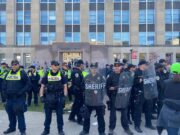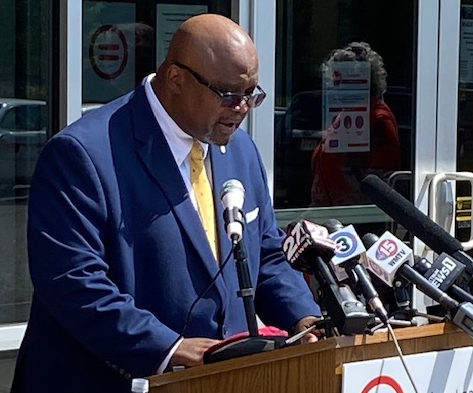“Owning a home and having the benefit of homeownership is critical to fully experiencing and living the American dream,” said Dr. Ruben Anthony, president and CEO of the Urban League of Greater Madison. “That’s what we all want. There’s nothing like being your own landlord and having a place that you and your family can call home. It is a remarkable feeling.
“A study came out recently that looked at Wisconsin and we are the third-worst in the nation – 23 percent of African Americans in this state own homes. And when you drill down and look at Dane County, things are even worse – only 10 percent of African American homeowners,” he continued. “We have to do something. And this program gives us the opportunity to move the needle and make progress in this area.”
Anthony spoke at a press conference on Thursday as the Urban League of Greater Madison unveiled a new initiative to help lessen those racial disparities in homeownership launching a $5 million program to increase homeownership among Black Madisonians.
“The Urban League is in the process of purchasing between 15 and 17 homes in economically challenged census tracts in the city,” Anthony told the crowd at the press conference. “We have $5 million to purchase these homes. Thus far, we’ve purchased 12 homes; we have five or so more to go.”
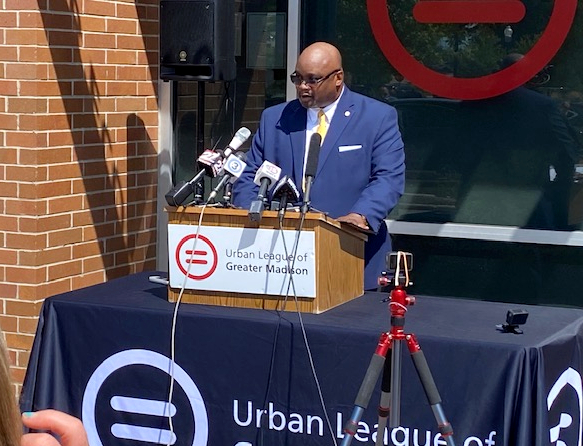
(Photo by A. David Dahmer)
Over the next 12 months, ULGM will perform extensive renovation on these homes and then re-sell them to low and moderate-income families seeking to become first-time homeowners. Several of the houses, Anthony said, will be available in the next 30-60 days.
“We will provide homeowners with no-down-payment, interest-only loans for seven years,” Anthony said. “After seven years, they will have to refinance their homes and take us out of the financing.”
Anthony said that the initiative is about making sure that they have affordable homes in fort worth for the people in the south Madison community.
“You can see gentrification is happening here on the south side of Madison and we want to make sure that as gentrification is happening, that we can still be affordable – that there will still be some houses around here that regular people can afford,” Anthony said. “That’s what this whole program is about.”
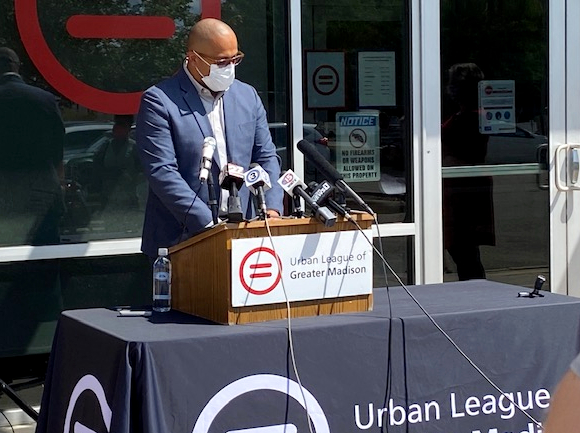
(Photo by A. David Dahmer)
At the press conference that took place in front of the Urban League of Greater Madison on Madison’s south side, Anthony was joined in making the announcement by partners in the project including WHEDA Executive Director Joaquin Altoro, Madison Mayor Satya Rhodes-Conway, South Madison Alder Sheri Carter, and other financing partners from National Community Investment Fund, Wells Fargo, and Johnson Bank.
The project will utilize the federal New Markets Tax Credit Program as the financing mechanism, Anthony said, and the tax credits are being allocated by National Community Investment Fund (NCIF), a Community Development Financial Institution (CDFI) headquartered in Chicago who invest in low and moderate-income communities all across the country.
The Wisconsin Housing & Economic Development Authority (WHEDA) will provide nearly $3.5 million in financing to the project.
“WHEDA is excited to team up with the Urban League, the City of Madison, NCIF (National Community Investment Fund), and Wells Fargo in financing this innovative approach to affordable homeownership,” said Altoro. “Today’s initiative builds on our previous partnership with the Urban League and City of Madison to launch a ground-breaking program supported by Low Income Housing Tax (LIHTC) credits. That effort helped some 50 families earning below 60% of the area median income to transition from renting to homeownership while building more than $2.5 million in equity. This new collaboration goes one step further by providing hardworking families with the opportunity to move directly into refurbished homes as owners.
“The Urban League’s focus on bridging the homeownership gap for people of color is critically important today,” he added.
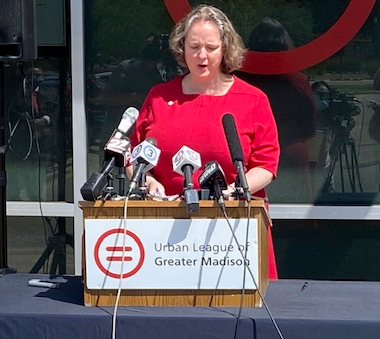
(Photo by A. David Dahmer)
The City of Madison will provide some additional critical funding – nearly $200,000 – to help bring down the final cost for the home buyer.
“The Urban League, WHEDA and the City understand how important homeownership is to our communities,” Rhodes-Conway said. “It’s the key to generating wealth in families and communities and its the key to passing wealth from one generation to the next and its the key to gaining greater control over housing expenses and access to other sources of credit and tax benefits. Ultimately, it’s the key to securing household and family security.
“The City’s support of this new initiative adds to the $1.25 million that the City already spends each year under our existing Home-Buy the American Dream program which expands homeownership opportunities among underrepresented communities,” she added. “I anticipate building further on these wealth-building efforts within the 2021 capital budget.”
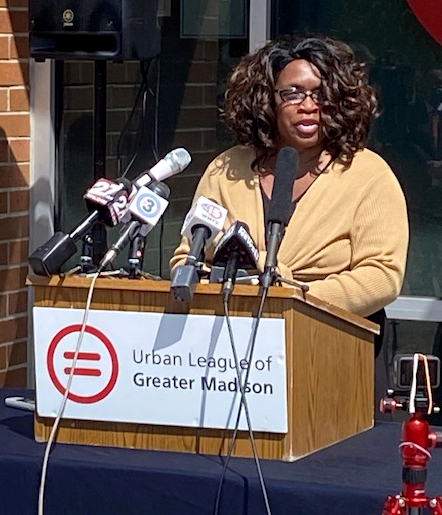
(Photo by A. David Dahmer)
An innovative and important component of the project will be a partnership with Operation Fresh Start (OFS), who will serve as general contractor on several of the homes. The ULGM and OFS will collaborate on a construction training project that will teach unemployed and underemployed adults construction skills while working hands-on to rehab these homes.
Southside Alder Sheri Carter, current Madison Common Council president and a lifelong Madison southsider, said that there are so many barriers that are prohibiting members of the Black community from purchasing the American dream – homeownership.
“Through the Urban League and their team, WHEDA, the financial teams, and the City, we have and will increase homeownership among Black Madisonians,” Carter said. “We have leveled the playing field. Never will we hear ‘we can’t do this.’ This dream will never die.”





